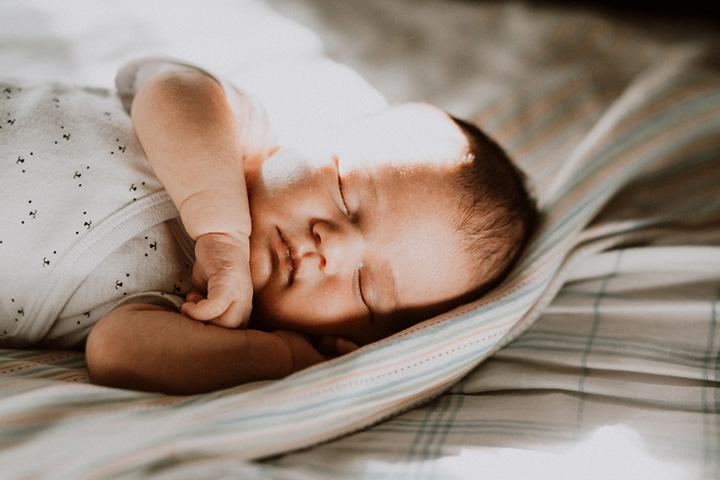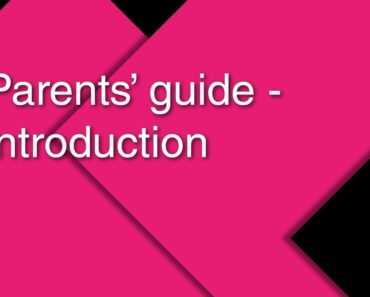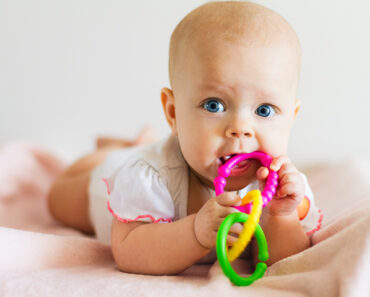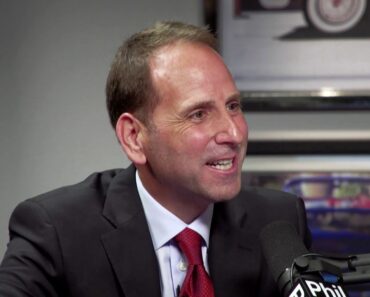Parents often discover that the sweet image of “sleeping like a baby” is not always true. Most newborn babies do not follow a sleep schedule, and they often make sleep sounds. Underdeveloped digestive and respiratory systems are the culprit of most sleep sounds in babies. Although baby sleep sounds are often strange, they are not harmful to the baby.
Most baby sleep sounds are normal and disappear as they grow. However, sleep sounds with signs of breathing difficulty or other symptoms may require medical care. Read this post to know about the causes, types, and tips to reduce sleep sounds in babies.
Causes Of Sleep Sounds In Babies
The following factors may cause sleep sounds in babies.
- Restless sleep: Immature nervous system and reflexes can cause movements and sleep sounds in babies. Lack of circadian rhythms can also contribute to sleep sounds in babies younger than six weeks (1).
- Active REM sleep: Babies may spend more time in active sleep, called rapid eye movement (REM), until six months of age (2). Babies can have faster breathing and heart rate during REM sleep.
- Sleep transitions: Babies have more sleep transitions than others. Their sleep cycles last about 50 minutes, and they may often make a sound while the sleep cycle changes (2).
- Hunger: Babies are frequent eaters, and hunger can drive various sounds while they sleep. They may tend to smack lips or suck fingers in the night before they fuss and cry for food.
- Immature digestive and respiratory systems: Although the baby is sleeping, they can have digestive and breathing sounds due to developing systems.
Many sleep sounds, such as smacking of lips, can be hunger cues and lets the caregiver or parent know that it is the time for feeding.
Newborn Breathing Sounds
Newborns are noisy sleepers since they may have respiratory noises when they sleep, and they are not a cause of concern in most cases.
Regular normal breathing sounds may include (3):
- Gurgling: This is a throat sound due to the gurgling of milk or saliva since their swallowing mechanisms are not fully developed.
- Stuffy nose: Babies can have a stuffy nose without actual cold because they breathe out their nose rather than their mouth while feeding. Nasal breathing can be noisy in babies due to narrow airways.
- Coughing: Newborns may cough in sleep to clear milk, saliva, or mucus from their throat. Burping the baby can reduce cough if it is due to digestive reasons.
- Snorting, sneezing, or whistling: Babies can sneeze, snort, or whistle more frequently than adults since they are nose breathers and have narrow nasal passages.
Babies can have irregular and noisy breathing patterns during sleep. Although these irregular breathing sounds are not considered normal breathing sounds, these are also part of the healthy development of the respiratory system.
Normal irregular breathing sounds in newborns may include:
- Periodic breathing: Babies go through a cycle of deep and rapid breathing periods, which sounds shallow or slow with a short pause between breaths. These pauses usually last less than 10 seconds and do not affect the baby. Periodic breathing may resolve within the first month of life.
- Seesaw breathing: This is a periodical expansion of the abdomen (belly) and chest contraction. This lasts for brief periods, and babies continue to breathe normally.
- Transient rapid breathing: These are periods of rapid and deep inhalation and often last less than a minute or two and return to normal breathing patterns.
Most of the irregular breathing sounds disappear as the lungs mature. Seek medical care if your baby has irregular breathing sounds lasting for a long time and with breathing troubles.
Newborn Digestive Sounds
You may notice that a lot of sounds are coming from your baby’s digestive system. This is because digestion can be noisy in babies since their digestive system is still developing. Also, newborns are frequent eaters, and they do have frequent bowel movements in the initial days of life.
The following digestive sounds are usually heard in babies (3).
- Belching
- Grunting
- Burping
- Growling
- Churning
- Gurgling
- Hiccups
- Passing gas
These sounds are normal and not a cause of concern in most babies. You may consult a pediatrician if your baby has increased digestive sounds with other gastrointestinal symptoms such as vomiting, spitting up frequently, diarrhea, or crying due to stomach pain.
When Do The Sleep Sounds Resolve?
Baby sleep sound resolves gradually as the baby grows. It may take a few months to resolve restless and noisy sleep in newborns. Most babies’ circadian rhythm becomes regulated by six weeks of life, and they may tend to have a longer duration of deep sleep. By six months, the noisy and restless sleepers tend to sleep calmly since they have less active sleep compared to newborns.
Tips To Reduce Sleep Sounds In Babies
Encouraging healthy sleep habits to help your baby sleep better could reduce sleep sounds. The following tips may help the baby sleep well (4).
- Using dim lights and keeping the room quiet at night helps the baby understand the difference between night and day. It helps their body prepare for sleep better.
- Know your baby’s sleep cues such as looking sleepy or glazed over, rubbing eyes, being fussy, or tired. Lay them in the crib for sleep when they show these cues.
- Encourage daytime naps to prevent excess tiredness and exhaustion by night.
- Follow bedtime routines to help the baby relax and fall asleep.
The following tips may help to avoid digestive problems and digestive sounds in babies.
- Try frequent feedings
- Burp the baby often
- Treat acid reflux (gastroesophageal reflux) since this may cause nighttime wheezing and grunting sounds
- Change formula or change maternal diet if breastfeeding if the baby has gas-related digestive sounds
A stuffy nose can cause breathing problems during the night. The following measures may help to ease the nasal passages.
- Use a newborn nasal aspirator
- Try a saline nasal rinse
- Clear mucus by gently wiping
If there is no nasal obstruction or stuffiness, there is no need to clean the nasal secretions often since this protects the baby from breathing in dust. It is advised to seek pediatrician advice to clean the baby’s nose; they can demonstrate the best and safe methods to clear the baby’s nose.
When To See A Doctor?
Sleep sounds are normal in most babies. Seek immediate medical care if your baby has breathing troubles. The following signs require prompt medical care.
- Lethargy
- Bluish skin (cyanosis)
- Breathing pauses for a longer time
- Chest retractions
- Nasal congestion with breathing difficulty
- Fever with digestive or respiratory symptoms
- Rapid breathing lasting more than usual
- Grinding at the end of each breath
Although sleeping on the tummy may reduce certain digestive sounds in babies, it is not recommended due to the risk of sudden infant death syndrome (SIDS). Your baby should have tummy time while awake and under supervision.
Most baby sleep noises are normal and disappear as your little one grows. Normal sleep sounds won’t be accompanied by breathing troubles or other concerning symptoms. However, if your baby is struggling to breathe, never hesitate to seek medical care.



![Castle 6×10: The Good, the Bad and the Baby || Caskett Talk Parenting of Future Baby [1080p HD/CC] Castle 6×10: The Good, the Bad and the Baby || Caskett Talk Parenting of Future Baby [1080p HD/CC]](https://usparenting.com/wp-content/uploads/2021/07/1626183030_maxresdefault-370x297.jpg)






























